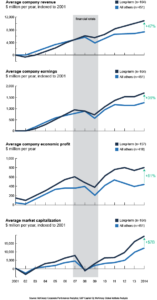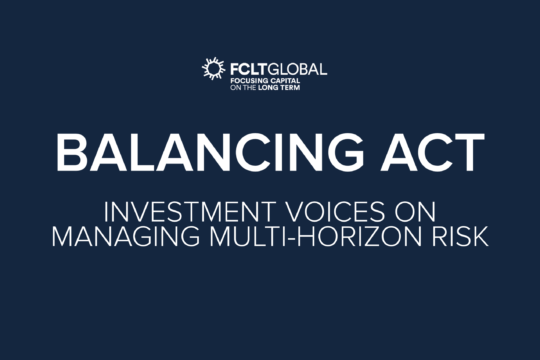
Those who stay the course through uncertainty will be the ones ultimately rewarded. Looking at data from past market downturns, including amid global crises, businesses are likely to steer to calmer waters, even treasure, over the long term.

Those who stay the course through uncertainty will be the ones ultimately rewarded. Looking at data from past market downturns, including amid global crises, businesses are likely to steer to calmer waters, even treasure, over the long term.
By Sam Sterling
The economic disruptions that monetary tightening and geopolitical tensions have caused are top of mind for companies and investors navigating rough seas right now. Financial markets are incredibly volatile and have been down-trending for several months, with potential to continue sliding as earnings contract – a logical consequence of monetary policy and increased expenses from supply chain challenges. Compound these issues with the ongoing recovery of the world economy following the COVID-19 pandemic, and there you have a triple threat to business and the general prosperity of society.
At the highest level, the data shows that sticking to your investing decisions and investing in your business, including through market turmoil, is the best way to continue generating long-term value. Covering a range of 5-year periods starting no earlier than 1999, no later than 2017, FCLTGlobal research suggests that companies that reinvest greater portions of their earnings back into the company outperform their peers (measured in return on invested capital) by 9% per year on average.
Looking specifically at a similar regime to what we see mid-2022 – such as during the great recession/global financial crisis – the same trend holds true. Data from McKinsey and FCLTGlobal found that long-term firms continued to reinvest in R&D through the financial crisis (measured between 2007-2014) at an annualized rate almost 5% more than at other companies.1 These firms experienced a short-term downturn at the start of the crisis but also experienced outsized growth and earnings over the longer term compared to peers, consistent with expectations of investing in future growth.

While for certain investors giving in to short-term pressures is a quick fix to save a dime and reduce stock hits in the present, it pays off in the end to continue to invest with a long-term scope.
Additional data from Boston Consulting Group of 1,800 companies between 1995-2020 concluded that resilient companies – those able to “absorb stress, recover critical functionality, and thrive in altered circumstances” – outperformed in the short term, in addition to recovering more quickly and outperforming over longer periods of time.2
The so-called ‘shaping advantage’ which BCG defines as resilient firms’ ability to “shape the dynamics of the industry in the postshock environment, which helps in achieving a greater extent of recovery” is an advantage that can be gained through continued investment. Whether that be through R&D, stakeholders, or CAPEX, the reinvesting in your company helps you outperform your peers and shape the industry in which you operate.
Data from FCLTGlobal and the Wharton ESG Analytics lab found that companies who ‘walk the talk’ by investing in stakeholders – measured in terms of ESG scores for different stakeholder groups – also consistently outperform. In fact, if all firms in the MSCI ACWI performed in the top slice of companies behaving in a stakeholder-focused way, there would be more than $3.2Trillion more value (in ROIC) over the 11-year 2010-2020 study window.3 There is a temptation to prioritize shareholders in periods of turmoil but while our research shows that this strategy does outperform in the near term (1-year subsequently), lagging performance in 3-year periods shows conclusively that outperformance does not persist.
Continued investment in the company and its stakeholders is the engine of growth. The challenges you face today are unprecedented, but temporary in the grand scheme of things. Unforeseen challenges are the only inevitable certainties of business. How consistently you navigate the risks will determine your reward.
1.https://www.bcg.com/publications/2020/how-to-become-an-all-weather-resilient-company.
2. https://www.fcltglobal.org/resource/predicting-long-term-success-for-corporations-and-investors-worldwide/
3. https://www.fcltglobal.org/wp-content/uploads/Walking-the-Talk_Stakeholder_Capitalism_Report.pdf

Stakeholder Capitalism | Report
17 January 2022 - What does it take to earn a return from implementing a multi-stakeholder strategy and offer a rebuttal to skeptics? To answer this question, we turned toward empirical analysis, comparing the characteristics and performance of companies pursuing various stakeholder-oriented strategies.

Risk and Resilience | Video
5 January 2022 - FCLTGlobal’s eight-episode risk webinar series encourages implementation of long-term tools from Balancing Act: Managing Risk Across Multiple Time Horizons and offers continuing professional education for a broad audience of investment professionals. This video serves as a one-stop resource to inform and to encourage longer-term management of investment risk.

Innovation | Report
9 August 2020 - R&D spending, especially long-horizon R&D project spending, faces a unique set of short-term pressures relative to other types of long-term investment. When facing short-term financial pressures, behavioral biases including manager risk aversion and uncertainty around forecasting potential future returns (among other things) lead to a tendency among management teams to cut long-horizon projects first. The declining tenure of managers, the lack of innovation-linked metrics in incentive compensation plans, the typically asymmetric return profile of long-horizon projects, and an investment community that often ignores the potential impact of long-horizon innovation spending in a company’s valuation analysis all contribute to this...